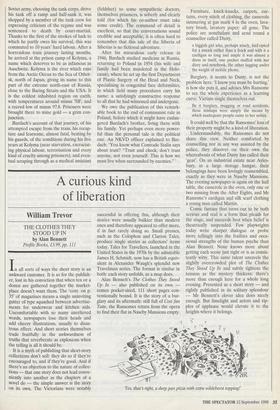Hate in a cold climate
Stephen Cang
MAN IS WOLF TO MAN: SURVIVING STALIN'S GULAG by Janusz Bardach and Kathleen Gleeson Simon and Schuster, £16.99, pp. 387 There are two stories in this riveting book. One is of a remarkable man's fight against an evil social system, of his enduring the greatest hardships, physical and emo- tional, of his survival and his ability to make a constructive success of his life. The other is of the nature of the system which Stalin developed, a story less familiar than that of the Holocaust but its equal in human suf- fering and destruction. The odd-sounding title translates what schoolboys once knew as a Latin tag (homo homini lupus), which here appears as a Russian proverb.
When Germany invaded Poland in 1939, Janusz Bardach was 20. From a comfort- able, middle-class home, he was well edu- cated, fluent in Russian, ambitious, energetic, deeply in love with his girl and an ardent believer in the promises of com- munism to the poor and oppressed. He had, however, been refused entry to univer- sity because he was a Jew — anti-Semitism in Poland, though not universal, was well established. It was not clear to him what course his life should follow.
The Germans' invasion from the west was at once followed by the Russians' from the east. Bardach enthusiastically joined the lat- ter at the border and returned with them to his home town in central Poland, just east of the Ribbentrop-Molotov line which divided the country under Hitler's pact with Stalin. There he began to experience at first hand the true nature of communism, under which anyone with property (not only real estate, but pictures, china, carpets and other signs of luxury) was labelled an 'enemy of the people'. There also the NKVD (the People's Commissariat for Internal Affairs, later known as the KBG) began to show him their particular mix of violence, cruelty, rapine, suspicion and rob- bery, all wrapped in official but secret authority: the stuff of malign dictatorship.
While the Russians suspected him as a Pole, however, his position as a Jew was not as dangerous in the Soviet camp as under the Germans, whose intentions towards the Jews had been made increas- ingly public for several years. He joined the Soviet army, choosing the tank corps, drove his tank off a ramp and half-sank it, was shopped by a member of the tank crew for expressing criticism of the regime and was sentenced to death by court-martial. Thanks to the first of the strokes of luck to which he partly owes his survival, this was commuted to 10 years' hard labour. After a horrendous train journey lasting months, he arrived at the prison camp of Kolyma, a name which deserves to be as infamous as Auschwitz. Kolyma is the river which runs from the Arctic Ocean to the Sea of Othot- sk, north of Japan, giving its name to this part of the extreme north-east of Russia, close to the Baring Straits and the USA. It is the coldest inhabited region on earth, with temperatures around minus 70F, and a record low of minus 97.8. Prisoners were brought there to mine gold — a grim con- junction.
Bardach's account of that journey, of his attempted escape from the train, his recap- ture and fearsome, almost fatal, beating by his guards, of the conditions during his five years at Kolyma (near starvation, excruciat- ing physical labour, terrorisation and every kind of cruelty among prisoners), and even- tual scraping through as a medical assistant (feldsher) to some sympathetic doctors, themselves prisoners, is soberly and clearly told (for which his co-author must take some credit). The command of detail is excellent, so that the conversations sound credible and acceptable; it is often hard to remember that this tale of the Siberia of Siberias is no fictional adventure.
After his miraculous early release in 1946, Bardach studied medicine in Russia, returning to Poland in 1954 (his wife and family had been murdered in the Holo- caust), where he set up the first Department of Plastic Surgery of the Head and Neck, specialising in congenital face deformities, in which field many procedures carry his name: a satisfyingly constructive response to all that he had witnessed and undergone.
We owe the publication of this remark- able book to the end of communist rule in Poland, before which it might have endan- gered Bardach's brother, living there with his family. Yet perhaps even more power- ful than the personal tale is the political one. An NKVD officer explained to Bar- dach: 'You know what Comrade Stalin says about trust? "Trust and check; don't trust anyone, not even yourself. This is how we must live when surrounded by enemies."'



































































 Previous page
Previous page